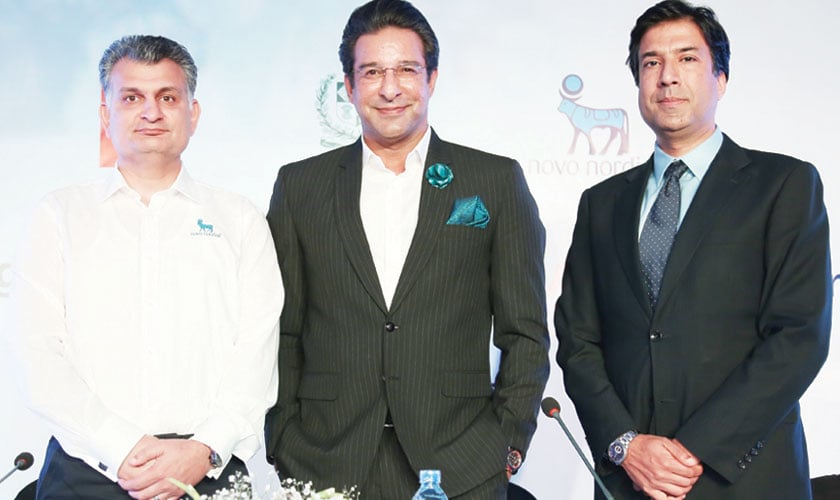Today is World Diabetes Day. You! takes a look...
health
Today is World Diabetes Day. You! takes a look...
Diabetes is a disease that occurs when your blood glucose, also called blood sugar, is too high. Blood glucose is your main source of energy and comes from the food you eat. Insulin, a hormone made by the pancreas, helps glucose from food get into your cells to be used for energy. Sometimes your body doesn’t make enough - or any -insulin or doesn’t use insulin well. Glucose then stays in your blood and doesn’t reach your cells. Over time, having too much glucose in your blood can cause health problems.
The most common types of diabetes are type 1, type 2, and gestational diabetes. If you have type 1 diabetes, your body does not make insulin. Type 1 diabetes is usually diagnosed in children and young adults. If you have type 2 diabetes, your body does not make or use insulin well. This type of diabetes occurs most often in middle-aged and older people. Gestational diabetes develops in some women when they are pregnant. Most of the time, this type of diabetes goes away after the baby is born. Type 2 is the most common type of diabetes.

Symptoms & Treatment:
The most common diabetes symptoms include frequent urination, blurred vision, intense thirst and hunger, weight gain, unusual weight loss, fatigue, cuts and bruises that do not heal, male sexual dysfunction, numbness and tingling in hands and feet.
Diabetes can be managed well but the potential complications are the same for type 1 and type 2 diabetes including heart attack, stroke, kidney disease, limb amputation, depression, anxiety and blindness. Although diabetes has no cure, you can take steps to manage your diabetes and stay healthy.
Since there’s no cure for diabetes, so treatment aims to keep your blood glucose levels as normal as possible and to control your symptoms to prevent health problems developing later in life.
Type 1 diabetes occurs because your body doesn’t produce any insulin. This means you’ll need regular insulin treatment to keep your glucose levels normal.
Type 2 diabetes is usually initially treated by following a healthy diet. It doesn’t have to be complicated or unpleasant. It boils down to a few key actions:
However, some people with type 2 diabetes need insulin injections to help control blood glucose levels.
World Diabetes Day :
World Diabetes Day (WDD) is celebrated annually on November 14. Led by the International Diabetes Federation (IDF), World Diabetes Day was created in 1991 by IDF and the World Health Organization in response to growing concerns about the escalating health threat posed by diabetes. World Diabetes Day became an official United Nations Day in 2006. It has grown from humble beginnings to become a globally-celebrated event which increases awareness about diabetes. Comprising hundreds of campaigns, activities, screenings, lecture, meetings and more, World Diabetes Day is proving internationally effective in spreading the message about diabetes and raising awareness for the condition.
The theme of World Diabetes Day 2017 is ‘Women and diabetes - our right to a healthy future’. There are currently over 199 million women living with diabetes. This total is projected to increase to 313 million by 2040. All women with diabetes require affordable and equitable access to care and education to better manage their diabetes and improve their health outcomes.
IDF has taken the inititative and has started the campaign. IDF has released campaign materials from May through to September to help the diabetes and wider WDD stakeholder community to prepare for World Diabetes Day on 14 November.
The campaign will promote the importance of affordable and equitable access for all women at risk for or living with diabetes to the essential diabetes medicines and technologies, self-management education and information they require to achieve optimal diabetes outcomes and strengthen their capacity to prevent type 2 diabetes.
Wasim Akram for Changing Diabetes:
The key to control diabetes is awareness. If proper awareness drives are not conducted throughout Pakistan to educate people about diabetes, by 2040, Pakistan may have the eight highest population of diabetic patients. Such high prevalence calls for continued efforts to improve public awareness regarding the disease. Therefore, in line with its commitment to improve the quality of life for people with diabetes, Novo Nordisk Pakistan has signed Wasim Akram as Brand Ambassador for Changing Diabetes(r) in the country.
The launch of the campaign was marked at the signing ceremony held at a Press Conference in Karachi, recently. The Danish Ambassador to Pakistan, H.E Rolf Holmboe and Dr Abbas Raza, Consultant Endocrinologist / Diabetologist were also present at the occasion. While signing the contract, Wasim Akram expressed his gratitude to Novo Nordisk Pakistan for the initiative by taking a lead to promote the importance of a healthier lifestyle which is critical for diabetes management.
“The public must however also plays their part by knowing the risk factors, leading healthy lifestyles and encouraging others to do so as well. As diabetes couldn’t defeat me, it cannot stop anyone from achieving their goals. Together, we can promote healthy communities and protect the future generations of Pakistan,” said Akram.
Wasim was diagnosed with type 1 diabetes at the age of 31, but his condition didn’t stop him from becoming one of the most successful fast bowlers in cricketing history. His success, despite diabetes, makes him a major inspiration for people with diabetes and therefore, a perfect fit for the Novo Nordisk Pakistan’s patient outreach efforts. For the past many years, Novo Nordisk has been actively involved to increase diabetes awareness in the country, with stronger efforts each year.